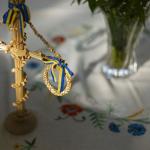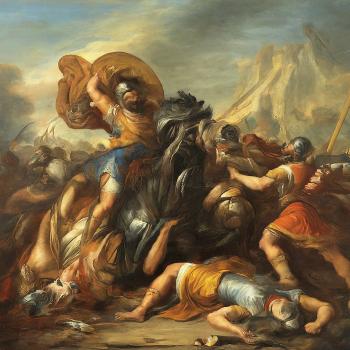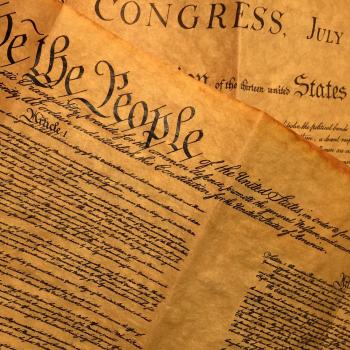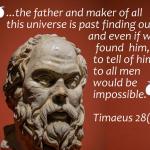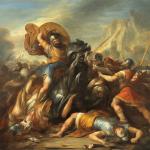Some Christians (and I am betting almost no Jews) take the entire Bible literally and view its accounts as historically accurate, seemingly without question.
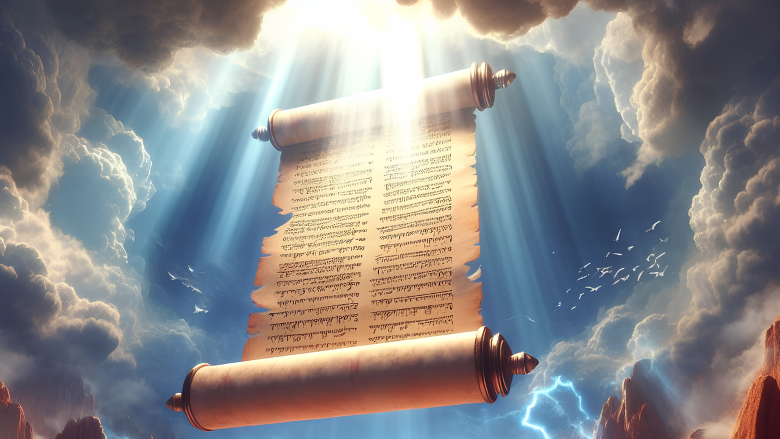
Is the Holy Bible the unerring revealed word of God?
This question has plagued scholars and theologians. It is a question that we cannot approach, much to the aggravation of fundamentalists, with an eye to discovering “proof,” a concept that is meaningless in matters of faith. In such matters, the idea of proof is not helpful or useful in any way.
There is no way to prove the Bible’s inerrancy just as there is no way to prove the inerrancy of the Holy Quran or any other book thought to be inspired or dictated by any deity.
The best thing we can do is to critically examine the oldest manuscripts and translations available to look for clues leading to evidence which can cause us to form tentative conclusions.
In spite of anyone’s claims to the contrary, this is the best that we can do.
Why would anyone believe that the Bible is without error?
Before we can attempt to answer that question, we need to establish that there is a difference between knowing and believing anything to be true.
We can know something is true when and because the evidence for it is so overwhelming that we cannot reasonably conceive that it is untrue.
One example is the sun.
We know that the Earth revolves around the sun and that because that is true, the sun will appear to rise each morning.
We know this because the demonstrable evidence is so overwhelming that we cannot imagine a day which does not fit the pattern.
Another example is the moon.
Muslims believe that Allah split the moon into two pieces and reunited the pieces at the request of the Prophet of Islam, Muhammad.
I suspect that there are fundamentalist Muslims who will assert that they know Muhammad split the moon. They know because their holy book says it is so. That is all the evidence they need to believe (NOT know) a thing that is demonstrably false or at the very least for which no one can provide evidence beyond the Holy Quran and the Hadiths that interpret and support it.

What is the evidence that the Holy Bible is entirely true and without error?
Let us look at the history of the idea of Biblical inerrancy as presented by scholars and theologians in our time.
William H. Barnes, writing in the Oxford Companion to the Bible, explains that the idea of scriptural inerrancy dates only to the 19th century and that modern protestant fundamentalists have continued to assert that all Bibles, including all translations containing everything that they contain, are uniquely the word of God and that there is no room for discussion of the thousands of variations in the texts from ancient times up to the most recent modern translations.
I have posed this question to friends who profess this belief: “which Bible is inerrant?” The King James, the RSV, the NIV, the ESV? Which one? They are all different.
The answers I have gotten are two-fold. The most common answer is a blank stare and undecipherable mumbling. The other answer is “All of them.”
I will spare the reader a lengthy discourse here. It seems unnecessary for reasoning readers.
Who asserts that the Bible is inerrant?
The Southern Baptist Church
The Southern Baptist Church has placed its statement on Biblical inerrancy in the very first place in its statement of beliefs: (Emphasis added)
Our Beliefs.
I. The Scriptures.
We believe that the Holy Bible was written by men divinely inspired, and is a perfect treasure of heavenly instruction; that it has God for its author, salvation for its end, and truth without any mixture of error for its matter; that it reveals the principles by which God will judge us, and therefore is, and shall remain to the end of the world, the true center of Christian union, and the supreme standard by which all human conduct, creeds, and opinions shall be tried.
There is little room for interpretation here. The belief is central to the theology of this group.
The Church of God
From the Declaration of Beliefs: (Emphasis added)
WE BELIEVE:
The Church of God believes the whole Bible to be completely and equally inspired and that it is the written Word of God.
The Roman Catholic Church
From What do Catholics Believe: (Emphasis added)
SCRIPTURE
Catholics believe that the Bible is the inspired word of God. From the beginning of Christianity, the Catholic Church defined the canon of Scripture – the books you find in every Christian Bible – and defined what it meant to be a follower of Jesus Christ. Through the centuries, it’s the Catholic Church that preserved the Bible, as well as many other written works, through its monasteries and libraries. Catholics believe that the Bible is God’s self-revelation, inspired and written without error. The Bible is not like any other book. Because the Scriptures were written under the positive influence of the Holy Spirit, they are considered to be sacred literature. We believe that God is revealed through the Patriarchs and Prophets in the Old Testament and through Jesus Christ in the New Testament. God’s revelation is also entrusted to the Apostles and their successors so that the Word of God is revealed in both Scripture and Tradition. Catholics believe that the Bible is a living document—it continually speaks to believers in every age.
It is important here to note that the Catholic Church goes beyond the assertions of the Southern Baptist Church and the Church of God.
In its statement, the Catholic Church places tradition on the same level with scripture and uniquely endows its bishops and priests (“apostles and their successors”) with the power to interpret the Bible for its adherents.
For those who still want to deal with proof (which I have shown, is not useful), I offer this:
PROOF INERRANCY IS HISTORICAL / BIBLICAL
There is overwhelming support for inerrancy from history. The idea that the Bible can contain errors is a relatively new belief. Author and scholar Harold Lindsell stated, “Apart from a few exceptions, the church through the ages has consistently believed that the entire Bible is the inerrant or infallible Word of God”
For the record, there is no “proof” given beyond men’s opinions, the “church” and the Bible itself. (There is also a historical belief in the Loch Ness monster.)
We can see that several Christian denominations regard the Bible as “inspired” and “inerrant.” While it is true that there is not necessarily agreement on what we mean by “inspired,” there can be little doubt what we mean by “inerrant.”
No book, no ancient scroll, no medieval c0dex, no set of assertions can be shown to be “true” simply because the text says it is.
Why would anyone believe that the Bible is NOT inerrant?
We can present a number of reasons to believe the Bible is NOT inerrant:
- The simplest answer is that no one has been able to show evidence beyond men’s opinions and the Bible itself, that the Bible is inerrant.
- There have been myriad translations in many languages. Bible Gateway shows more than 50 translations in English alone.
- There are hundreds of ancient and medieval texts which contain many discrepancies and contradictions.
Lack of evidence
Theologians and apologists have simply not been able to present any evidence beyond the Bible itself and its many interpretations and opinions, that there is any reason to believe in Biblical inerrancy. Where many arguments and apologetics have been offered, the evidence always goes back to the idea that the Bible is the inerrant Word of God simply because it says it is.
Problems of translation
Here, a simple (and quite well known) example illustrates the point:
The idea of the Virgin (or Miraculous) birth of the Christian Messiah is said to be have been prophesied by the Prophet Isaiah in a passage (which I have previously shown to be completely unrelated to any such claim) about Ahaz, one of the ancient Kings.
The King James Bible states:
Isaiah 7:14
King James Version
14 Therefore the Lord himself shall give you a sign; Behold, a virgin shall conceive, and bear a son, and shall call his name Immanuel.
The Revised Standard Version states:
Isaiah 7:14
Revised Standard Version
14 Therefore the Lord himself will give you a sign. Behold, a young woman shall conceive and bear[b] a son, and shall call his name Immanuel.
Textual discrepancies and contradictions
Scholars have shown time and again that scribes, copyists, monks, clerics, theologians, bishops, priests and anyone else who had access to versions of the Bible for the past three thousand years or so had daily opportunities to make accidental and deliberate changes to the texts of the Bible. This continues to the present day as new editions and translations are introduced. For example, the Revised Standard Version was recently updated by the Society of Biblical Literature in 2021 to be released in 2022.
It is not our purpose here to outline the history of Biblical changes, updates, translations and interpretations but a quite simple question can pretty definitively provide the evidence we are seeking.
When anyone claims the Bible to be inerrant, we have only to ask…which one?
Writers, scholars, theologians, podcasters and would-be prophets have made a great deal out of the many discrepancies and contradictions that exist between and among the various texts, editions and translations of the Bible. Reasoning readers and students can make productive use of this information in studying the many aspects of Biblical history and textual analysis.
It does not seem to me to be especially productive here to make any attempt to show the Bible fundamentalists that they are wrong about inerrancy. People are free to believe whatever they want.
It is helpful to realize that these people are simply wrong and have been fooled by a church establishment.
What does Asherah have to do with all this?
In our title, we said “Go ask Asherah” to obtain an answer to the question of inerrancy.

To make certain we are all singing from the same hymn book, here is a concise picture of who Asherah is or was.
In her paper, Asherah and the God of the Early Israelites, Johanna Stuckey shows that the Canaanite and Ugaritic goddess Asherah, seen to be the consort or wife of the God Most High (El). (emphasis added)
Though all three ancient Levantine great goddesses appear in the
Hebrew Bible, the Christian Old Testament, Asherah occurs most often:
forty times in nine books. The biblical texts are hostile witnesses, for
they either vilify the goddess or, more often, obliterate her
grammatically, for instance, by referring to her in the masculine plural
as “the asherahs.” Until the Ugaritic tablets were deciphered beginning
in the 1930s, most scholars did not even speculate that “the asherahs”
might be obscuring a goddess. They interpreted “the
asherahs” as either wooden poles, cult objects from Baal worship, or
groves of trees. Only a brave few claimed that “the asherahs” referred
to a goddess citing such passages as I Kings 18, in which “prophets of
Asherah served Queen Jezebel.
The first detailed study of Asherah in the Hebrew Bible after the
Ugaritic discoveries concluded that “the asherah” represented both a
wooden cult object and a goddess, a position some scholars still hold today.
Unquestionably, “the asherahs” were usually wooden; they stood
upright, often beside altars, along with stone pillars. However, in at
least eight instances, they are described as carved. Thus,
far from being merely wooden “cult poles,” they were probably quite
large carved images. As was the case with cult statues in other areas
of the Eastern Mediterranean, “the asherahs” almost certainly would have been “animated” ritually. Thus they did not just represent the goddess, but actually were worshipped
as Asherah herself. Further, according to the Bible, a statue of Asherah stood in the Solomonic temple in Jerusalem for about two-thirds of its existence. Asherah “must, then, have been a legitimate part of the cult of Yahweh”.
Stuckey bites off a pretty big chunk of Hebrew Bible history in her short but informative article. We can outline the steps in her assertions simply.
- The chief deity of the pre-Israelite people of Canaan was the God El.
- The wife or consort of El was the goddess Asherah.
- Two sources of the Hebrew Bible, generally known as the Elohist and Jahwist sources respectively call the god of Israel Elohim and YHWH. Elohim is a plural Hebrew form used by the writers as a singular name.
- Israelites, Philistines, Canaanites and other groups inhabited the area of the eastern shore of the Mediterranean Sea and the hill country immediately to the east, to and beyond the Jordan River during the late Bronze Age (1550-1200 BCE), during the Bronze Age collapse (1200-1150 BCE) and into the early Iron Age (1150-1000 BCE).
- There is little agreement among scholars as to the specific details of immigration, conquest, cooperation, collaboration and conflict between and among these groups.
- Over time, the Canaanite god El began to be identified with the storm god Ba’al and Asherah became the consort of Ba’al.
- The Hebrew Bible speaks a great deal about the wars between Canaanite Ba’al and the Hebrew Henotheistic god YHWH.
- The Hebrew Bible’s authors represented both the Hebrew cults of Elohim and YHWH and the northern and southern Israelite kingdoms.
- The authors, writing during and after the Babylonian captivity, for reasons that are rather complex, needed to consolidate power in the priesthood and in the Jerusalem temple. Rival worship of Ba’al, Asherah and any other deity did not fit the priests’ plan so they had to be eliminated.
- Josiah, King of Judah, following the fall of the northern kingdom of Israel to the Assyrians, destroyed all visages of other deities including Asherah from the Jerusalem temple and disbanded cults of other deities besides YHWH.
- It is important to note here, that the Israelites did not become monotheistic until well after the Babylonian captivity.
- The authors, in writing, editing and redacting the text of the Hebrew Bible, simply removed the goddess Asherah from the text and substituted the words for tree or grove of trees where her name had appeared in the text. (Asherah was frequently depicted by a wooden idol.) By substituting the words, the priests successfully removed the goddess from consideration by the people who became Jews and then later, the Christians.

What does this tell us about inerrancy?
I showed several examples of evidence leading to a belief that the Bible is in fact, not inerrant. That it cannot be.
I believe I have shown that the authors, editors, copyists and redactors had a method and a purpose. In order for the religion to evolve in keeping with the needs and wishes of the religious authorities and their perceived needs for the Israelites , El (El Shaddai) had to become YHWH.
The YHWH cult had to be the surviving cult of Israel.
The Bible had to show that YHWH had defeated Ba’al over an over (note that the finally entirely monotheistic text spent a great deal of effort showing the defeat of a god the Bible also claims did not exist).
There was no room in this religion for any other deities and certainly not a goddess.
Asherah, worshipped by the children of Israel for centuries, disappeared when the Hebrew Bible text was finally settled by decree of the priests.
Is The Bible Unerring? Go Ask Asherah.
There are many thoughts and opinions on this subject. I would be grateful if readers would consider my assertions and add a comment. I believe that discussion is one of the best ways to achieve understanding.



